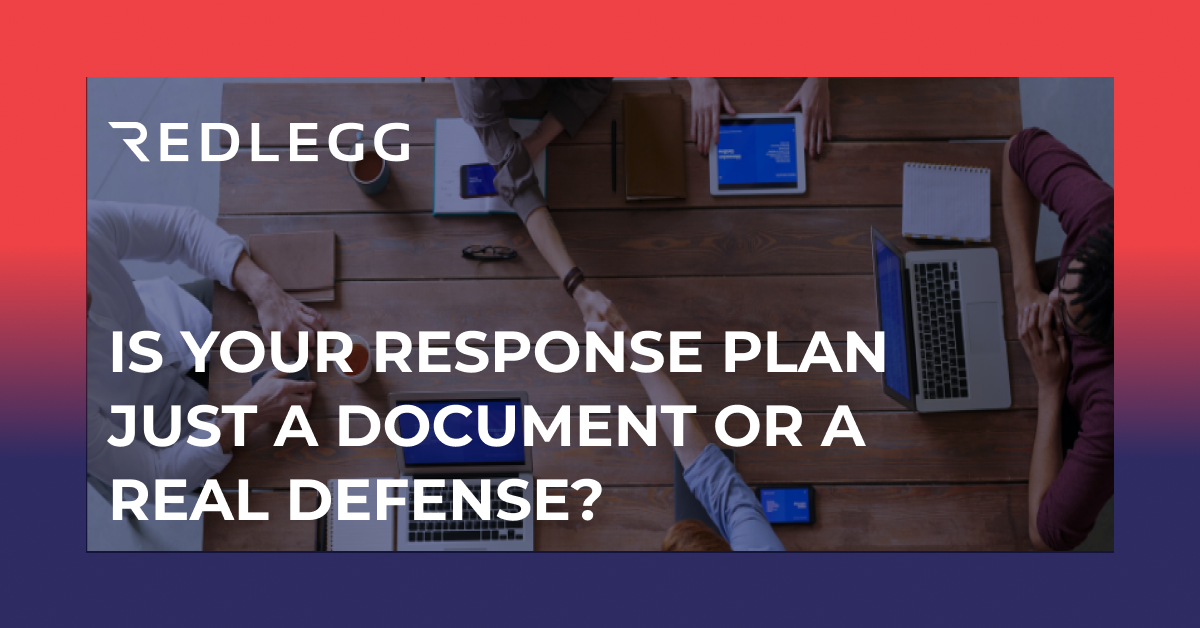11 min read
By: RedLegg Blog
While your Incident Response Plan is a necessary part of your cybersecurity and InfoSec strategy, tabletop exercises can take your strategy to the next level.
Information Security is information risk management with the goal of preventing the likelihood of an incident. Your strategy to protect your company and client data can be summarized as…
- Identifying your business’s greatest assets, threats, and security weaknesses
- Evaluating your risk and how you’ll address that risk
- Knowing where and how to mitigate
- Monitoring on-going activity and making improvements to your security in order to reduce those risks
Tabletops also help invest in the four key trends shaping InfoSec in 2019: cybersecurity maturity, security in corporate culture, phishing resistance, and incident response planning.
Incident response tabletop exercises can become foundational to your on-going posture, mitigation, and big picture strategy.
We’ve found six main reasons why tabletop exercises should become a routine component of your information security evaluations.
1. Tabletop Exercises Validate Your IR Plan.
Completing your Incident Response Plan is the first step in creating your response strategy, but this strategy should ultimately be validated, before it’s put to the test when an incident occurs in real-life. Validating your response effectiveness is part of addressing and assessing risks, and a response exercise helps your team practice those developed processes and procedures.
Not only can a tabletop exercises confirm your response effectiveness, but it can also evaluate the effectiveness of your current security operations. The tabletop facilitator can work with you to identify gaps in your current operations and provide feedback to mitigate those risks.
Lastly, tabletop exercises demonstrate your team’s ability to handle a breach. Concern about team performance can be put to rest with actionable items and feedback from the response exercise itself.
2. Tabletop Exercises Fulfill Your Business Objectives.
By practicing and training for a breach, you and your team better protect information and data assets, reduce the potential costs of a breach, increase your response speed and effectiveness, and reduce the likelihood of a negative impact on your company’s reputation following an incident.
Tabletop exercises, as a strategy tool, can better prevent attacks, reduce overall costs, train your team, and protect your reputation. Your security strategy becomes a hands-on activity with clear ties to your business goals.
3. Attacks Are Evolving. So Should You.
Attacks are consistently and constantly evolving to more successfully attack and breach companies. Tabletop exercises can help keep your training and preparedness up to date and on the cutting edge of what’s happening in the cybersecurity world today. Tabletops and tabletop facilitators help better assess your attack vectors.
Will your Incident Response Plan and InfoSec strategy hold up to new attacks and threats in the real-world?
4. Tabletop Exercises Can Improve Organizational Culture.
Many companies still struggle with employee cybersecurity education and preparedness. To help your staff know their roles, and better perform their roles when an incident occurs, a tabletop exercise is a hands-on activity you can use to train your staff and raise awareness.
Take your Incident Response Plan from the page to real-life scenarios. Tabletop exercises can turn your InfoSec strategy into a practical, organizational effort that makes security education personal.
5. Conducting Tabletops Demonstrates a Mature InfoSec Program.
No company’s security posture can be confirmed to be 100%, and an organization that believes this is most likely a company with the goal of constant security improvement.
Tabletop exercises show your team, leadership, the board, and clients that you take company assets and data seriously, that you are actively advancing your strategy and tools.
If you’re looking to identify gaps in your security or put your team to the test, tabletop exercises are an easy, attainable, and do-able next step.
6. Tabletop Exercises Are a Practical Component of Your Response Foundation.
Tabletop exercises confirm that your security strategy is on the right path while also forming the foundation of effective team response.
Tabletops can bring you direction, build a foundation for improved response and security measures, and demonstrate incident preparedness. We like to say “train as you fight,” because you don’t want to wait until an incident occurs to find out how your team will response.
Better get-ahead of your attacker, better handle the incident, and better mitigate the fallout.
Tabletop exercises should be part of your InfoSec strategy to help address risk and prepare for real-world security incidents. Make sure your plans and your team will be effective when, not if, the attacker comes.
Want more? Read the 4 strategic ways to test your IR Plan and learn about the secret individual who can bring an edge to your plans.








